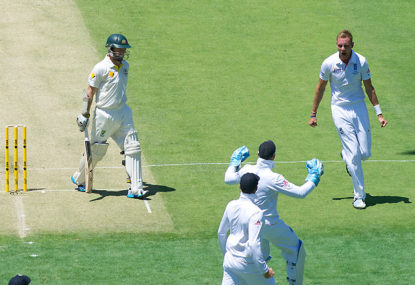Australia’s newspaper industry is dominated by Rupert Murdoch’s tabloids, one in each state capital. With their varied names and a highly consistent brand of tackiness, they’re like a series of cartoon villains or pre-mixed vodka flavours.
It’s emblematic of their simple-minded approach, and the simple-mindedness they assume of their readers, that the Queensland variant chose the first day of the Ashes to lead a saucepan-banging campaign against Stuart Broad, the England paceman.
In a front-page gimmick calling him a “smug pommy cheat”, they insisted that Australian fans give him “the silent treatment” to rob him of potency, and that they would refuse to call him by name for the duration of the match.
Well, good luck with that.
After such a preamble, it was almost inevitable that Broad would tear through the Australian side after Michael Clarke opted to bat on a beautiful Gabba pitch.
Finding enough generic terms for a man who took five of the eight first-day wickets will be a headache for the paper’s subeditors, presuming they still employ any.
Of course, the intent was comical – don’t mistake my tone for outrage. It’s more a weary amusement with just how low some editors set the bar. Broad did look like a goose when he edged to slip at Trent Bridge last July and failed to walk; it’s not so much a point of ethics as dignity.
But if an Australian had pulled the same move and helped his side to an elusive Test win, those fans would have called him lucky or applauded his cheek while gladly accepting the result.
The point is that overt aggression against an opponent looks pretty dumb when your side doesn’t have the goods to back it up.
That goes as much for the crowd chanting abuse at Broad as it does for the media outlets militating against him.
Broad ignored them all, knocked over Australia’s top four, came back to break the one substantial partnership of the innings, and grinningly held the ball aloft in salute to those thousands rhythmically speculating about his intimate personal habits.
Far from being offended, he whistled along. “It’s quite catchy,” he said disarmingly at his post-match media conference, which he’d strolled into with a copy of a certain Queensland newspaper folded under his arm.
There has been altogether too much talk from the Australian media in the lead-up to this series. Until the targeting of Broad, though, most of it involved talking up the Australians.
Day after day, we heard how they’d pulled together under the coaching of Darren Lehmann. David Warner was in irresistible form. Steve Smith was growing into a Test batsman.
George Bailey would be the middle-order glue. Craig McDermott was back with the bowlers, Mitchell Johnson was back to his best, Michael Clarke’s back was back, and we’d back Ryan Harris for back-to-back Tests.
Warner said the English were afraid.
The narrative was of lessons learned and gaps closed. Lehmann wrote on the morning of the Test that “we have learned a lot from what happened in England and we have to rectify that here in Australia… It is not so much winning the first moment as the big moments.”
They didn’t win either.
Instead, what Australia produced on Day One was yet another episode in a predictable series that began in India last March.
The only difference between this and Days of Our Lives is that the American soapie’s catastrophes take longer to reach their conclusions.
On Thursday (November 21), Australia’s top six mustered 107 between them, on a perfect batting deck, against bowling that was never better than decent. It was precisely the pattern of the Ashes just gone. Not once in their three defeats there did Australia top 300.
In those 36 trips to the crease, their top six batsmen produced 13 single-figure scores, 25 scores under 30, and eight above 50. There is no point telling people what you’ve learned from failure. All that counts is demonstration.
Only Clarke – an increasingly long-suffering captain in a difficult position – was realistic. “I’m not going to sit here and promise the world, tell you everything is going to be different,” he said the day before the Test. It is unfair that he has been saddled with this build-up.
The same outlets creating it will make him the scapegoat should they be proved wrong.
In the meantime, England have prepared merrily free of the scrutiny of an Australian press too busy with parochial self-congratulation. “We almost feel like silent assassins on this trip,” said Broad when asked about the host country’s pre-series verbosity. “We’ve gone under the radar and just focused on what we have to do. All the attention has been on Australia, which is perfect for us.”
The point is that talk isn’t cheap, it’s worthless. Go too hard, whether talking yourself up or your opponent down, and you risk donating a last laugh of nitrous oxide potency.
It will take an extraordinary effort to get back in this match, let alone the series. There’s every chance that won’t happen. Whichever way it goes, from inside the dressing room and out, Australia needs to pipe down and let the team play.
Geoff Lemon is a writer and radio broadcaster. He joined The Roar as an expert columnist in 2010, writes the satirical blog Heathen Scripture, and tweets from @GeoffLemonSport. This article was first published by Wisden India, in a new-founded Ashes partnership.





























































































